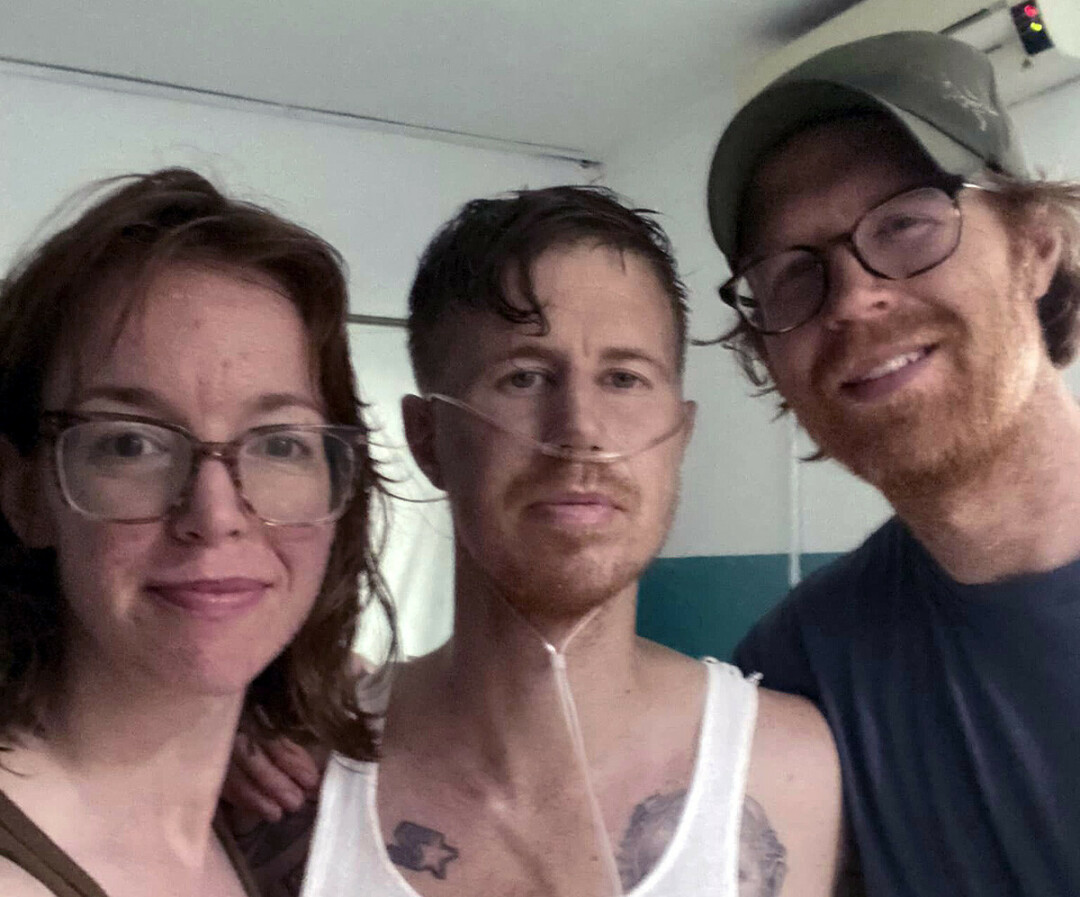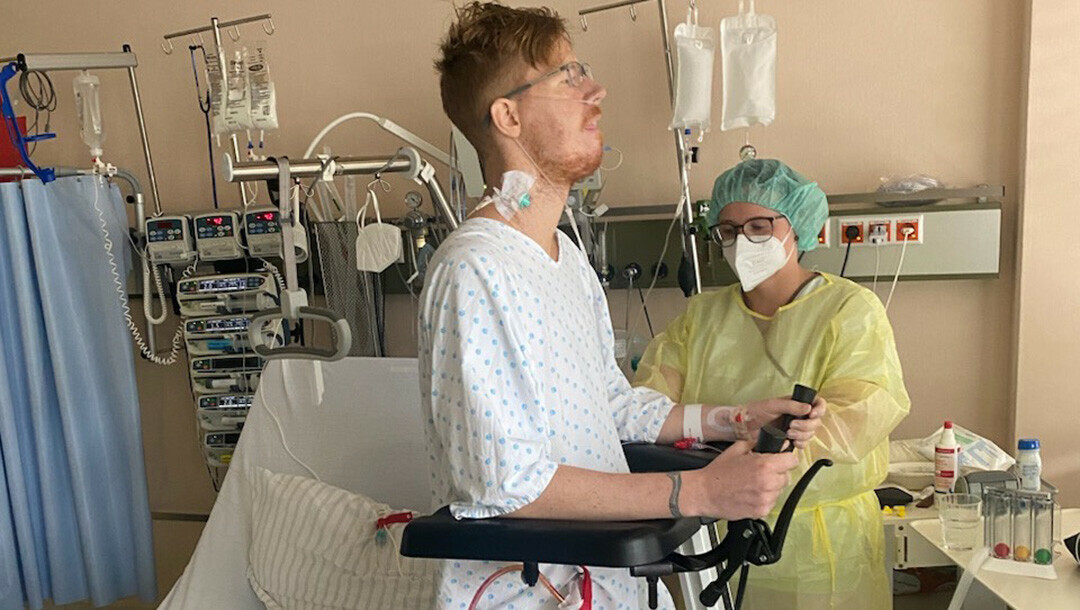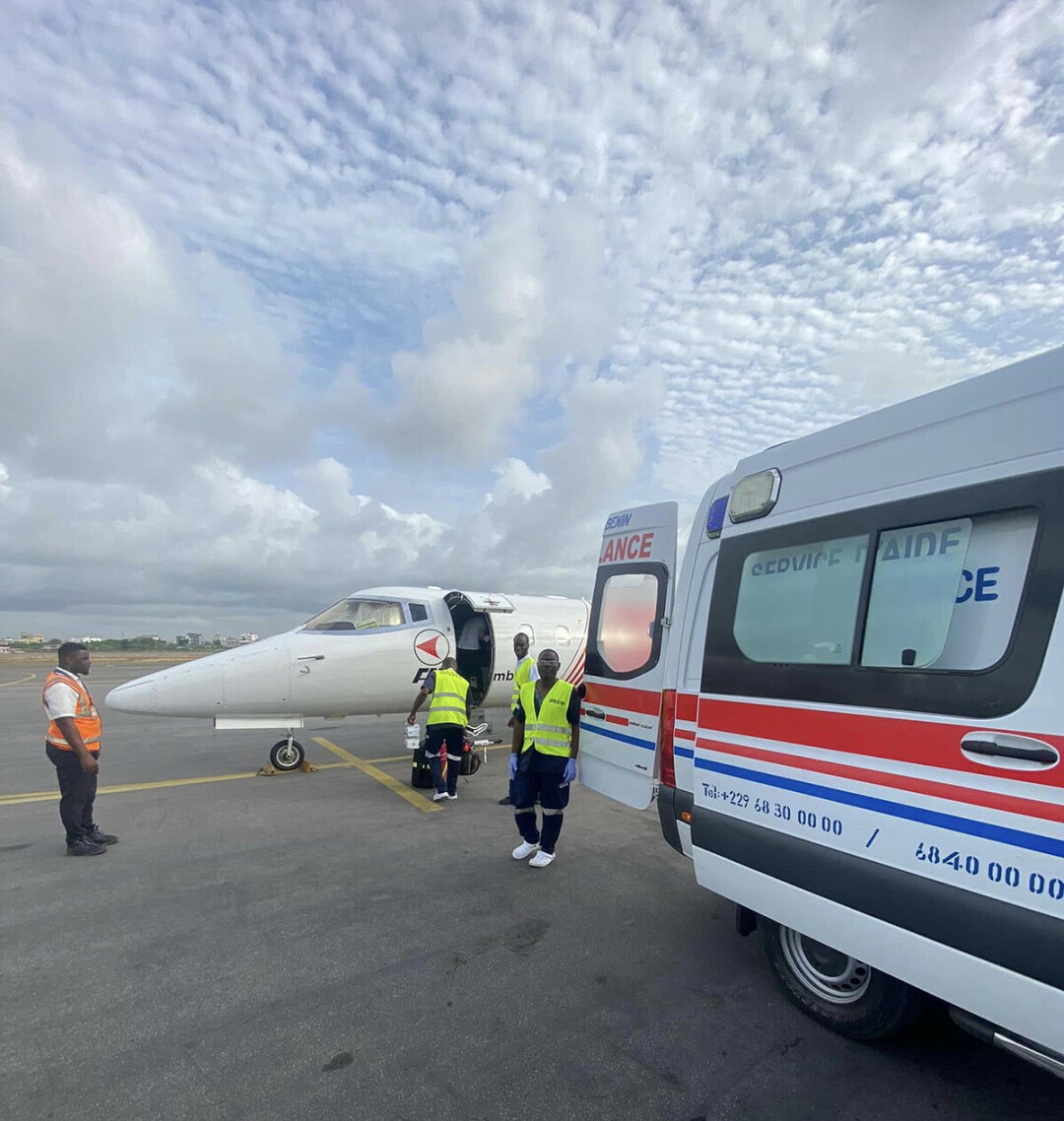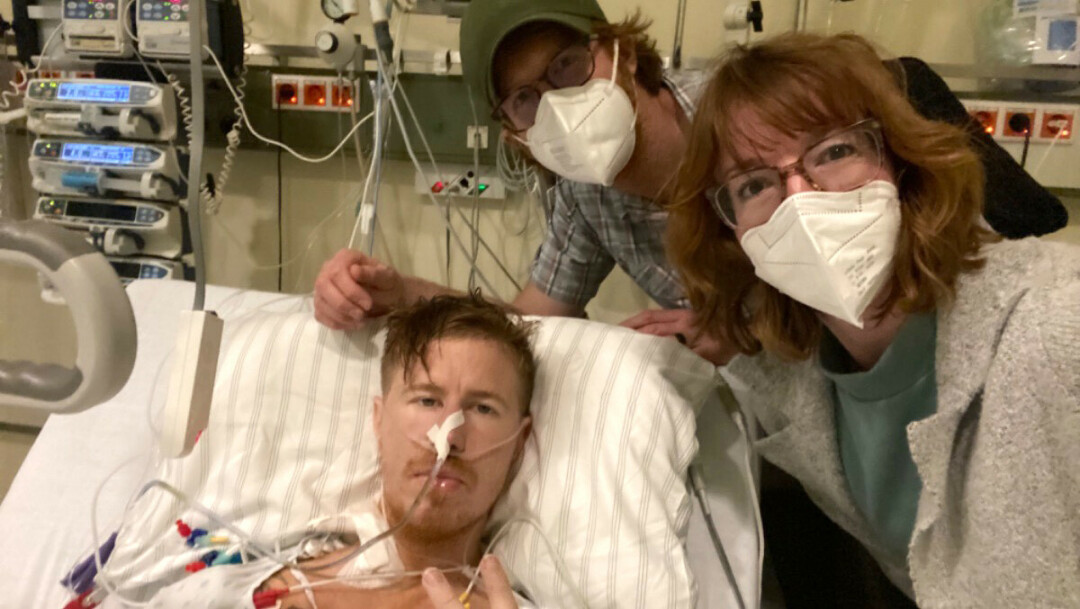BROTHERLY LOVE: Chippewa Valley Doctor Journeys to Africa to Help Stricken Brother
Dr. Brady Didion credits family, community with support on life-saving mission

More than halfway through a medevac flight from the West African nation of Benin to a hospital in Germany, Dr. Brady Didion finally became confident that his brother, Micah, was going to survive a life-threatening and weeks-long medical ordeal.
Brady, 38, a family physician who lives in Eau Claire, was escorting his brother on the emergency flight after Micah had mysteriously fallen ill earlier this spring while on a visit to Benin. Micah, 31, who later spent weeks recuperating at his parents’ home outside Eau Claire, was at the center of an international medical saga that enlisted help from the Chippewa Valley and around the world.
Just hours before the March 11 flight, Brady had to convince a German critical care doctor to take off with an ailing Micah aboard.
”
I had to end up talking her into flying him because there was no other option, and we tried to make that clear.
DR. BRADY DIDION
ON HIS BROTHER'S MEDEVAC TRIP FROM BENIN TO GERMANY
“She looked at Micah and she listened to his abdomen and she’s like, ‘I can't fly him. We can’t take him. You’ve got to find another situation here,’ ” Brady recalled a few weeks later during an interview.
“I had to end up talking her into flying him because there was no other option, and we tried to make that clear,” Brady continued. Medical treatment was limited in the Beninese hospital where Micah was being treated, and doctors were unable to operate on him there. The German doctor relented, and said, “We’ll try.”
Brady called his parents, Brad and Ellen Didion, with a sobering message: “This is a time where you should talk to (Micah) because I don’t know if you’re going speak with him again because this could be the end.”

OVERSEAS ODYSSEY
Saying the situation was gut-wrenching is not hyperbole: Micah was suffering from a massive, painful infection throughout his abdomen. Micah, who divides his time between Madison and the Chippewa Valley, first became ill with what he thought was a stomach bug in late February during a visit to Benin, where he graduated with an MBA from the African School of Economics in 2021 (and where he recorded a music video for a collaboration with Beninese singer Manzor, which got tens of thousands of views on YouTube). Micah was there to speak at his alma mater and explore some business opportunities in Benin, which is 6,000 miles from Wisconsin, but he ended up hospitalized.
It was exactly the kind of situation where it’s helpful to have a doctor in the family, and Micah reached out to Brady with details of his condition, sharing a CT scan.
“Within an hour it was very clear that we need to go there,” Brady recalled. “He’s really sick, and we just don’t know the ultimate strategy here, because there’s mixed opinion on if he could get surgical treatment for this (in Benin).”
“I was cognizant of what was going on. But sometimes the pain would be too distracting. Sometimes I kind of wish I wasn't so aware.”
micah didion
Brady dropped his own medical practice to fly the next day with his sister, Kelsey, to Benin, a country of 14 million about two-thirds the size of Wisconsin. French is the dominant language in Benin, so it was helpful that Kelsey spoke French – as did Micah, when he was capable of communicating.
“It didn’t take long to assess that he was critically ill and needed to be in an ICU with constant monitoring lines and tubes,” Brady said of his brother’s condition. Micah also desperately needed a surgeon with appropriate surgical staffing and facilities, which weren’t available in the small hospital in Cotonou, Benin’s largest city.
Micah was suffering from sepsis, his kidneys were failing, and his pain wasn’t well-controlled. Despite his condition, Micah recalled, “I was cognizant of what was going on. But sometimes the pain would be too distracting. Sometimes I kind of wish I wasn’t so aware.”
His siblings spent three days sharing Micah’s 10-foot-by-10-foot hospital room, repositioning him every 30 minutes around the clock because he was in such pain. While Micah was kept alive by massive doses of antibiotics, the Beninese doctors recognized that their patient needed care elsewhere if he was to survive.
“I don’t want to disparage them,” Brady said of the Beninese medical team. “They did the best they could. They just didn’t have the tools.”
The necessary tools would be found overseas, and that would require dangerous and costly medical evacuation.

BOOKING A FLIGHT
As Brady pondered his brother’s condition, back in the Chippewa Valley the rest of the family sprang into action. “Callie, my wife, just got on it,” Brady explained with a snap of his fingers. “I cannot say enough that she made so much of this happen. She was the IT mastermind behind everything.”
Stateside, Callie and Brady’s parents worked to coordinate travel plans and researched medevac options. They retained the services of an air ambulance provider based in Nuremberg, Germany, but there was a catch: The flight has to be pre-paid before the plane would take off for Africa.
“Do you just have almost $70,000 in cash lying around?” Brad Didion, Micah’s father, asked rhetorically. Ultimately, the money was wired overseas, but not all of it arrived immediately, leading to frantic transatlantic phone calls that began at 3am.
The financial issues were finally settled, and the air ambulance made the first leg of its journey to Benin. Brady convinced the German doctor to clear his brother for the return flight, but there was a catch: As a consequence of the infection, Micah was suffering from an ileus — a condition when the bowels don’t function because of inflammation and infection. There was air in his bowels, which the doctor was afraid would expand and cause a rupture when the plane reached a high altitude. As a result, the jet had to fly at a lower-than-normal altitude with the cabin pressure kept the same as it would have been at sea level. While the scenery on the flight was breathtaking, Brady noted – especially over the Sahara Desert – it also made for a nerve-wracking flight.
However, as their destination neared, the family was ultimately able to breathe a sigh of relief. “We started to go up over the Alps and the critical care doc said, ‘He’s gonna be fine. He’s gonna make it,’ ” Brady said. “That was the turning point.”
After landing in Germany, Brady texted his parents and said, “ 'We made it, he did great.’ … Many tears were shed at that time.”

JOURNEY HOME
Following touchdown in Nuremberg, the siblings took a 90mph ambulance ride on the autobahn to a hospital in Eichstatt, Germany, which had agreed to take Micah. There, he underwent six surgeries over the course of 13 days and was visited by his parents and sister-in-law.
After the first operation, the German surgeon was frank with Brady. “He said, ‘It’s the worst abdomen I’ve seen in 30 years,’ ” Brady said. “He said he should have been operated on as soon as he started to feel bad, and it had been almost a week. It’s crazy he survived.”
Despite the surgeries, the ultimate source of Micah’s ailment was never identified, Brady said: There was no perforation of his bowel, and no appendicitis or diverticulitis.
“It’s a cliché to say we don’t know how much time we have, but we really don’t.”
dr. brady didion
Now, fortunately, Micah is on the mend. He returned to Wisconsin in early April and is back at work in his remote job as a senior business development associate for a Seattle-based logistics firm called Flexe. He’s back in Madison now and is even pondering some international travel next winter. “I get bored here,” he explained. However, he added, “I’m going to be sticking to the Western Hemisphere for a few years. … I don’t see myself going back to Benin anytime soon.”
“He’s got wanderlust,” interjected his father wryly, “but we want him to wander less.”
Considering the ordeal’s financial cost, Micah and his family are more convinced than ever of the importance of purchasing travel insurance. They’re also convinced of the kindness of their fellow human beings – from medical personnel in multiple countries to friends and family who offered advice and support to the hundreds who donated to a GoFundMe to benefit Micah.
“I think it’s just a testimony that humankind can be kind, and this demonstrates that: Brady gave up what he was doing, left his family, left his job, to go help his brother,” said his father.
Brady is modest about his role, saying his wife and others who worked behind the scenes are the real heroes. For this doctor, the saga is a reminder of how a fluke illness can threaten the life of an otherwise healthy person.
“It’s a cliché to say we don’t know how much time we have, but we really don’t,” he said.
You can read more about Micah Didion and his medical saga on his GoFundMe page (although the fundraiser is closed).






















